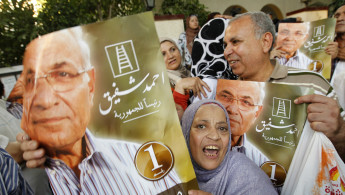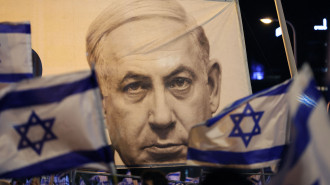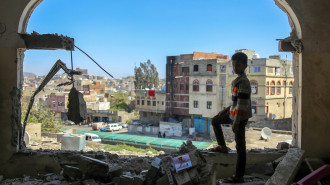Shafiq's return to prominence raises questions over Sisi rift
Shafiq's return to prominence raises questions over Sisi rift
Analysis: As Ahmed Shafiq resigns from his political party and gives a controversial interview, is evidence mounting of a split between the president and the former prime minister?
4 min read
Many expected Shafiq to win the Egyptian 2012 presidential elections [AFP]
The party of former Egyptian Prime Minister Ahmed Shafiq has rejected his resignation as leader.
Yahia Qadry, the deputy leader of the National Movement party, told Daily News Egypt on Monday that a delegation would fly to the UAE, where Shafiq is living in exile, to convince him to change his mind.
The Egyptian National Movement party was set up by Shafiq in 2013, in opposition to the Muslim Brotherhood and Mohammed Morsi, president at that time. They faced criticism that many of the party's members had been part of the Mubarak regime.
"I had to resign because of the difficult and unnatural circumstances I faced while doing my job," Shafiq said on Saturday.
Shafiq has been in exile in the UAE since narrowly losing the Egyptian presidential election to Mohammed Morsi in 2012. He was then investigated over alleged illegal land deals while serving as civil aviation minister in the government of Hosni Mubarak.
While Shafiq was acquitted in December 2013, which might have allowed him to return, he chose to remain in the UAE for "security reasons".
Shafiq's laywer, Yehya Qudri, told al-Monitor this week that he was still waiting for Shafiq's name to be removed from the list of those who are monitored when entering Egypt, and banned from leaving the country.
Some analysts speculate that the military regime used the 2011 revolution in order to regain some power that they lost under Mubarak. Shafiq - although being a "military man" - was seen by army chiefs as close to the old regime and not as trustworthy as Sisi when it came to acting in the interests of the army.
In May, al-Shourouk newspaper reported divisions between the two, after Shafiq's supporters in the government were sent letters to keep them in line.
Al-Shurouk quoted a government source telling Shafiq to "forget about" playing any role in politics, and accused him of seeking to destabilise the "legitimacy" of Sisi.
"The former presidential candidate is communicating with important sides, who are still backing him and continue to hope that he would have a role in politics," the source, speaking to Shourouk said.
"These people [Shafiq's supporters] are mistaken in thinking that major political changes will take place in Egypt," he added.
Last week, Al-Asema satellite station cancelled the broadcast of an interview with Shafiq for fear of upsetting the government. It was later aired this week.
On the talk show, Shafiq said he was furious because the Egyptian state did not invite him to attend the announcement of the ousting of former President Mohammad Morsi on 3 July 2013 - despite his support for the 30 June plan.
He added that the Egyptian intelligence service knew about his efforts and meetings with US officials in the UAE.
"Many people asked me to run for president before Sisi did, and they launched the 'You are the President' campaign to support me... but after Sisi announced he was running for president, I supported him," Shafiq added.
Al-Monitor reported that the "you're the president" campaign has recently resurfaced in Egypt, demanding that Egypt allows Shafiq to return to the country.
In the interview he also denied that that there had been any "battle of the camels" during the 18 days of the revolution, referring to when protesters in Tahrir were charged by pro-Mubarak supporters riding camels and horses.
He also gave some details of the final moments with Mubarak before he announced his resignation.
Although Sisi and Shafiq are both backed by the UAE, analysts say that Shafiq is supported by Dubai, while Sisi is supported by Abu Dhabi, and there has been a long-running dispute and rivalry between the two emirates.
Mohammad bin Rashid, the emir of Dubai, had said that he was against Sisi running for president in January 2014.
Recently, Abu Dhabi has reportedly demanded results from Sisi, even calling on him to improve his relationship with Shafiq, who they consider an alternative from within the same regime.
In recent months, Sisi has been on the receiving end of criticism from his traditional allies in the media and pro-regime figures, such as Tawfiq Okasha, who criticised his Germany visit, and Amr el Deeb.
In a leak that surfaced in March, Shafiq was heard saying that it was a "bizarre and ignorant decision" for the Supreme Council of the Armed Forces to nominate Sisi for the presidency.
Yahia Qadry, the deputy leader of the National Movement party, told Daily News Egypt on Monday that a delegation would fly to the UAE, where Shafiq is living in exile, to convince him to change his mind.
The Egyptian National Movement party was set up by Shafiq in 2013, in opposition to the Muslim Brotherhood and Mohammed Morsi, president at that time. They faced criticism that many of the party's members had been part of the Mubarak regime.
"I had to resign because of the difficult and unnatural circumstances I faced while doing my job," Shafiq said on Saturday.
Shafiq has been in exile in the UAE since narrowly losing the Egyptian presidential election to Mohammed Morsi in 2012. He was then investigated over alleged illegal land deals while serving as civil aviation minister in the government of Hosni Mubarak.
| [Shafiq's supporters] are mistaken in thinking that major political changes will take place in Egypt. - Anonymous source |
While Shafiq was acquitted in December 2013, which might have allowed him to return, he chose to remain in the UAE for "security reasons".
Shafiq's laywer, Yehya Qudri, told al-Monitor this week that he was still waiting for Shafiq's name to be removed from the list of those who are monitored when entering Egypt, and banned from leaving the country.
Some analysts speculate that the military regime used the 2011 revolution in order to regain some power that they lost under Mubarak. Shafiq - although being a "military man" - was seen by army chiefs as close to the old regime and not as trustworthy as Sisi when it came to acting in the interests of the army.
In May, al-Shourouk newspaper reported divisions between the two, after Shafiq's supporters in the government were sent letters to keep them in line.
Al-Shurouk quoted a government source telling Shafiq to "forget about" playing any role in politics, and accused him of seeking to destabilise the "legitimacy" of Sisi.
"The former presidential candidate is communicating with important sides, who are still backing him and continue to hope that he would have a role in politics," the source, speaking to Shourouk said.
"These people [Shafiq's supporters] are mistaken in thinking that major political changes will take place in Egypt," he added.
Last week, Al-Asema satellite station cancelled the broadcast of an interview with Shafiq for fear of upsetting the government. It was later aired this week.
On the talk show, Shafiq said he was furious because the Egyptian state did not invite him to attend the announcement of the ousting of former President Mohammad Morsi on 3 July 2013 - despite his support for the 30 June plan.
He added that the Egyptian intelligence service knew about his efforts and meetings with US officials in the UAE.
"Many people asked me to run for president before Sisi did, and they launched the 'You are the President' campaign to support me... but after Sisi announced he was running for president, I supported him," Shafiq added.
| Many people asked me to run for president before Sisi did - Ahmed Shafiq |
Al-Monitor reported that the "you're the president" campaign has recently resurfaced in Egypt, demanding that Egypt allows Shafiq to return to the country.
In the interview he also denied that that there had been any "battle of the camels" during the 18 days of the revolution, referring to when protesters in Tahrir were charged by pro-Mubarak supporters riding camels and horses.
He also gave some details of the final moments with Mubarak before he announced his resignation.
Although Sisi and Shafiq are both backed by the UAE, analysts say that Shafiq is supported by Dubai, while Sisi is supported by Abu Dhabi, and there has been a long-running dispute and rivalry between the two emirates.
Mohammad bin Rashid, the emir of Dubai, had said that he was against Sisi running for president in January 2014.
Recently, Abu Dhabi has reportedly demanded results from Sisi, even calling on him to improve his relationship with Shafiq, who they consider an alternative from within the same regime.
In recent months, Sisi has been on the receiving end of criticism from his traditional allies in the media and pro-regime figures, such as Tawfiq Okasha, who criticised his Germany visit, and Amr el Deeb.
In a leak that surfaced in March, Shafiq was heard saying that it was a "bizarre and ignorant decision" for the Supreme Council of the Armed Forces to nominate Sisi for the presidency.



